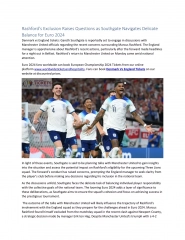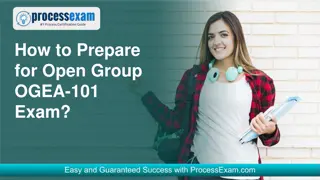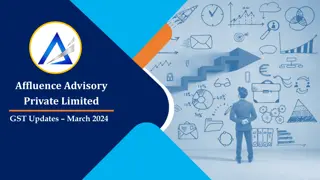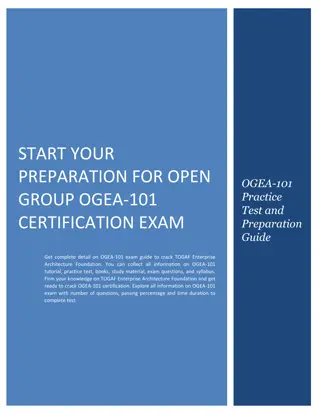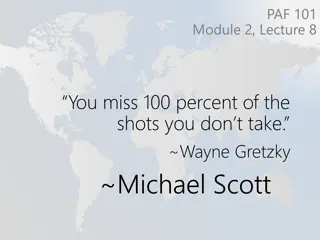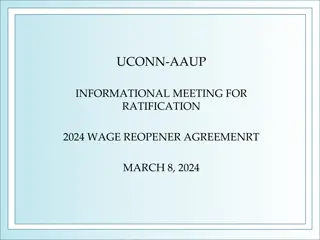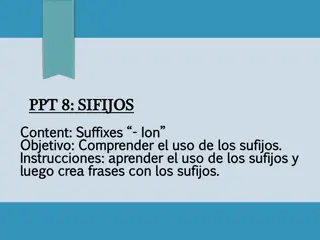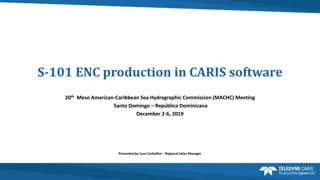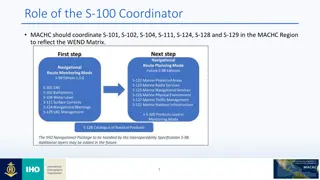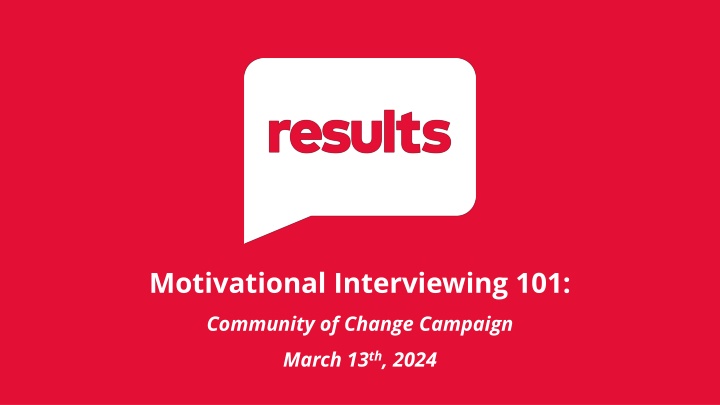
Unlocking the Power of Motivational Interviewing in Advocacy
Empower yourself with Motivational Interviewing techniques to enhance advocacy skills. Learn how to build rapport, understand perspectives, and facilitate change through respectful communication. Discover the transformative impact of MI in engaging policymakers and driving positive outcomes in advocacy efforts.
Download Presentation

Please find below an Image/Link to download the presentation.
The content on the website is provided AS IS for your information and personal use only. It may not be sold, licensed, or shared on other websites without obtaining consent from the author. If you encounter any issues during the download, it is possible that the publisher has removed the file from their server.
You are allowed to download the files provided on this website for personal or commercial use, subject to the condition that they are used lawfully. All files are the property of their respective owners.
The content on the website is provided AS IS for your information and personal use only. It may not be sold, licensed, or shared on other websites without obtaining consent from the author.
E N D
Presentation Transcript
Motivational Interviewing 101: Community of Change Campaign March 13th, 2024
2 Webinar Objectives Advocates will leave with a basic comprehension of Motivational Interviewing and how it can be utilized in their advocacy, regardless of their current skill level They will leave with an understanding that finding similar values with your members of Congress can help begin to guide the conversation into a place of mutual respect and understanding Advocates will feel encouraged to craft their own content using the OARS technique for lobby meetings and beyond
3 Who here has ever experienced a barrier before with a member of Congress?
Before we REALLY begin: 4 Motivational interviewing was designed for health behavior change, not policy advocacy. Therapists and others who use MI spend years learning MI but you re in a quick workshop. I have not gone through the certification process to train people in MI You develop skills over time and the best way to learn is through practice and coaching! Please check out RESULTS six 1 hr session of "Getting unstuck with your members of Congress using MI" here Keep an eye out for more information on another round of Motivational Interviewing sessions in September 2024
5 What is Motivational Interviewing? MI is a guiding style of communication, that sits between following (good listening) and directing (giving information and advice). MI is designed to empower people to change by drawing out their own meaning, importance and capacity for change. MI is based on a respectful and curious way of being with people that facilitates the natural process of change.
6 How can MI help you in your advocacy? Can help combat resistance and inaction from your members of Congress Can help transcend the adversarial mindset and use values-based advocacy to make the case for change. Can help speak with difficult family members and your other interpersonal relationships!
7 TENETS OF MOTIVATIONAL INTERVIEWING APPLIED TO POLICY ADVOCACY Compassion: Empathy for the policymakers point of view and how the policymaker arrived at that view Acceptance: Acknowledgement that the policymaker and their view has some inherent worth Partnership: Seek to walk alongside the policymaker to guide him/her/them towards change Evocation: Understanding that the policymaker holds wisdom on how change works in their context
8 So how do we begin? Start by thinking about all the things you have in common with your member of Congress.
11 What can cause a member of Congress to change their mind? Cognitive Dissonance is often discussed in relation to a mismatch between different components of attitudes For example, a positive attitude towards helping those in need but a contradicting behavior of not giving money or support to individuals experiencing homelessness o Creating Cognitive Dissonance can mean we feel ambivalent...we genuinely have a disconnect between two conflicting beliefs. That disconnect makes us feel uncomfortable, driving us to resolve it. This is where you can come in, and begin a conversation with your policymaker to make them move through the Stages of Change o
MI moves them through the Stages of Change Maintenance Consistent, Zealous 4. Action Moving, Engaged, Acting. 3. Preparation Open, Looking, Interested 2. Contemplation Maybe, Ambivalent 1. Precontemplation Angry, In Denial, Defensive
The Backfire Effect:
15 What if my member of Congress says something oppressive during the meeting? USING MI DOES NOT MEAN THAT YOU STOP USING OTHER SKILLS! Sometimes you DO need to call out (or in) classist, racist, sexist, ageist, and other discriminatory beliefs in ways that do not fully fit with MI and that is fully appropriate If this happens, please let RESULTS Staff know!
16 There are many Motivational Interviewing techniques... Today you'll be learning about only 1 of them, called OARS!
17 But first, any questions so far?
Core Skills: OARS Creating Collaborative Relationship Open Questions Affirmations Reflections Summaries
19 Open-ended Questions Questions can t be answered with yes or no Instead, they evoke and invite participation Curious questions: Explain Tell me about Could you say more about ? Could you please clarify ? How ? What ?
Open the Dialogue with Open Questions Closed: "Would you please sign the Senate UN HLM Letter?" Open: "With the deadline for the Senate UN HLM letter coming soon, I am curious to know where the Senators stands on signing on?" Try the 6 W s: Who, What, When, Where, Why, and How Try it: with your MOC 20
21 Let's practice! "How can we help the Representative/Senator encourage their colleagues to cosponsor The End TB Now Act to set bold targets to reach and treat the most vulnerable populations for all forms of TB?" "Who does the Representative/Senator look to for more information about The End TB Now Act as a path to end poverty?"
22 Affirmations Recognize and reinforce success, but be genuine! Partner Offer perspective in face of difficulties Express optimism See any progress as progress, use the Ladder of engagement! It is a challenging issue. I can see that you are trying to weigh what will work best for your constituents.
Sources For Affirmations Their website Newspapers from their area Our own notes from building a personal relationship with the office
24 Let's practice! I, and our constituents, really appreciate the actions you ve taken to support efforts to get TB prevention work back on track since the start of the COVID-19 pandemic." "We appreciate that you understand the urgency to set bold targets to reach and treat the most vulnerable populations for all forms of TB."
25 Reflections Mirror what the policymaker is saying Demonstrate that you are partnering with the policymaker and understand what the policymaker is trying to communicate to you Clarify the policymaker s train of thought State what the policymaker means Show collaboration
26 Let's practice! Amplified Reflection: Reflect what the policymaker has said in an exaggerated way. This encourages the policymaker to argue less and can elicit ambivalence. o You believe because TB funding is expensive, it s impossible to TB prevention affordable enough to convince your colleagues it s worth their vote. Double-sided Reflection: Reflect the policymaker s ambivalence. o On the one hand, you believe that improving Tuberculosis legislation is a tall order, and on the other hand, you know how important it is for everyone around the world to have access to TB treatment. Side with the Negative: Reflect back one side of the policymaker s ambivalence in order to elicit the other side of their ambivalence. o I wonder if you think that because spending money on TB infrastructure is expensive, the government should not try to improve the situation for impoverished communities worldwide; The End TB Now Act should not be supported by Congress. Reflect a Feeling: Share what you think the policymaker s underlying feeling is. o It sounds like you are worried about your constituents wellbeing. That's wonderful, because the the Tuberculosis High-Level Meeting in NYC last month will improve the lives of millions in our community, state, and across the world.
27 Summaries LET THE LINK RELEVANT INFORMATION ALLOW THE POLICYMAKER TO HEAR THEIR OWN MOTIVATIONS AND AMBIVALENCE HELP TO CLARIFY THE POLICYMAKER S STANCES AND PLANNED ACTIONS POLICYMAKER KNOW YOU RE LISTENING AND UNDERSTANDING HELP TO BRIDGE/TRANSITION BETWEEN TOPICS FOCUS ON THE MOST IMPORTANT ASPECTS OF YOUR CONVERSATION
28 Let's practice! So, to summarize, I understand that the Senator is a bit hesitant to endorse any TB legislation until they receive data from us showing the impact, did I hear that correctly? "In summation, after this meeting, you'd like for me to follow up with the Senators foreign policy aide?"
29 Role Play!
30 To get more comfortable utilizing MI... Let s practice! Everyone break off into groups of 3. Have someone role play as the Member of Congress, the advocate, and then a 3rd partner to take notes of how the dialogue goes!
31 Please contact me if you'd like to brainstorm ways to build your relationship with your MOC's through Motivational Interviewing Sarah Leone at sleone@results.org
@RESULTS_Tweets /RESULTSEdFund www.results.org @voices4results

